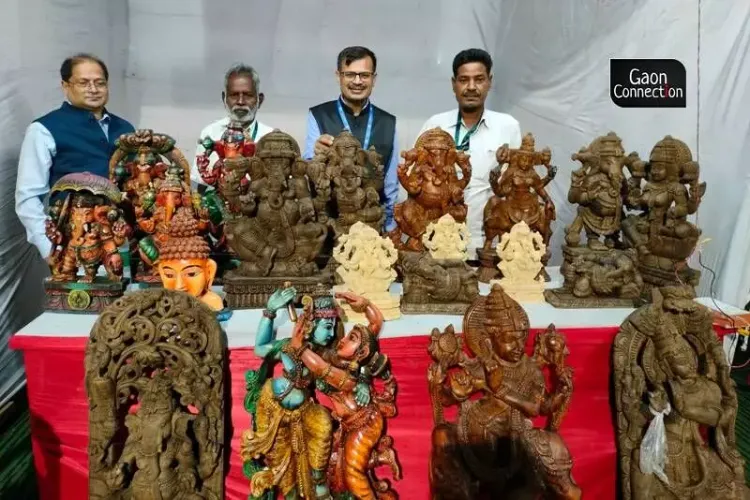
Chennai
Geographical Indication (GI) tag filed for the lipsmacking Madurai 'Jigarthanda', a cold drink made from condensed milk, may grab headlines, but it is relatively obscure products like ‘kuliyadichan sivappu arisi’ (parboiled red rice) that gain the most from the certification, said stakeholders.
Ask C Natarajan from Kallakurichi, who has been carving wood for 44 years now, having come into the craft when he was a mere 12 year old, and he’ll tell you of a time when middle men ruled the roost.
“They paid us a pittance,” added 56-year-old Natarajan.
Things improved marginally with the involvement of the Department of Handicrafts, Tamil Nadu government, according to him.
“We could earn a bit better, but we were expected to go to those exhibitions that were organised across the country. It cut into our production time,” Natarajan told PTI over the phone.
All that changed in 2021, when Kallakurichi wood carving, a specialised technique of wood carving that is traced back to Chola period, and yet languishing for lack of market, was awarded the GI tag.
“Earlier, only a handful of us were able to support ourselves fully with our craft. But after the GI tag, all of us — about 200 families in Kallakurichi — make a comfortable living now. More importantly, the customers come to us, giving us time to concentrate on our craft,” said Natarajan.
Although not as enthusiastic as Natarajan, third generation Thanjavur Veenai manufacturer Venkatesan said after the GI tag, which was awarded this year, his customer base has certainly expanded.
“Until recently, outside of Tamil Nadu, we used to get occasional customers from Andhra Pradesh and Karnataka, at the most. Now we are getting many outside enquiries. More people, not just from India, but also abroad, seem to know what a Thanjavur Veenai is,” added Venkatesan.
Incidentally, Thanjavur Veenai holds the distinction of being the first musical instrument to get the GI tag.
This is possible because of enhanced brand visibility, said S Vincent, Member Secretary, Tamil Nadu State Council for Science and Technology (TNSCST), which plays an important role in the identification and protection of potential GI products in Tamil Nadu.
“It didn’t happen overnight, but in the last two years we were more successful than when we started in the early 2000s. We are able to get the younger generation involved,” added Vincent.
In Natarajan’s case, for instance, his son is fully involved in marketing their wood carvings online through various social media pages, especially Instagram reels.
Vishnupriya, project scientist at TNSCST, who is leading the GI tag promotion team, said Tamil Nadu now leads when it comes to the number of GI applications filed every year.
“To date, we have filed 7,541 GI tag applications. In comparison, Maharashtra has filed 5,309 and Karnataka 4,346 applications,” added Vishnupriya.
This year, Tamil Nadu has filed 14 GI tag applications so far, she said.
K Ganesh Murthy, Executive Director and CEO of MABIF, a platform for marketing GI tagged agricultural produce and food products from Tamil Nadu, established with the help of National Bank for Agriculture and Rural Development (NABARD) and Tamil Nadu Agricultural University (TNAU), said the real challenge is in marketing products that are not known outside of the immediate region where the product originates.
This is when a validation like GI tag can play wonders, he added.
Perhaps that is why Sholavandan 'Vetrilai', a famous betel leaf supposedly with medicinal properties from Madurai, which even finds mention in Sangam literature, is yet to get a GI tag, lesser known Athoor 'Vetrilai' from Tuticorin already was awarded one in 2023.
Murthy said it is not guaranteed that GI tag will be awarded once the filing is done.
Vishnupriya said of the 7,541 GI applications filed from Tamil Nadu, 71 have received GI certifications so far.
“But it is worth the effort because there is at least a 10 per cent to 15 per cent growth in revenue with a GI tag. One of the reasons why farmers particularly are showing more interest in getting their culturally significant products registered,"said Murthy.
Once a product is identified for GI tag, it also piques the interest of academic researchers, as Intellectual Property Rights (IPR) cells are set up in higher education institutions to process GI applications, said Vincent. Till now, about 40 IPR cells are set up in various universities and colleges of Tamil Nadu, he added.
For instance, when Kollimalai Coffee was identified as potential GI tag product, researchers from K S Rangasamy College of Technology, Tiruchengode, where the GI application was processed, worked along with the coffee growers to develop a AI powered drone to observe the incidences of diseases and the geology, helping them to enhance production, said Vincent.
“Another example is the RTPCR kit developed by Mother Teresa Women’s University Kodaikanal researchers, which can verify the authenticity of GI-tagged Kodaikanal Malai Poondi (garlic), preventing adulteration,” he said.
ALSO READ: Faisal Rizvi’s acumen makes him the most celebrated legal mind of Chhattisgarh
“We are still in initial stages, but GI tag has proved to be a valid certification that helps farmers and artisans to tackle conventional market challenges and create a USP for their products,” added Murthy.
